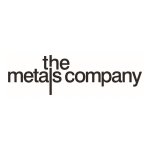- Company exploring the world’s largest known deposit of battery metals in deep-sea polymetallic nodules can help Europe decarbonise swiftly and effectively.
- A reliable and responsible supply of metals for the clean energy transition will be key if Europe is to meet its increasingly ambitious emissions reductions targets.
- Soaring demand for electric vehicle battery metals due to the phaseout of gasoline-powered cars could see shortages of key metals such as nickel and copper as early as 2024.
- The Metals Company’s deep-sea nodule resource brings the potential for an abundant and low-cost supply of critical battery metals that can be processed in Europe with a fraction of the environmental and social impacts of land ores.
VANCOUVER, British Columbia–(BUSINESS WIRE)–Today, The Metals Company (formerly DeepGreen), a developer of the world’s largest and highest-grade estimated source of battery metals, announced it has joined two of the European Union’s foremost industrial alliances—the European Raw Materials Alliance (ERMA) and the European Battery Alliance (EBA)—as the bloc advances its plans to become a global leader in the sustainable production of the batteries necessary to store clean energy and power electric vehicles (EVs).
As a member of these industrial alliances, The Metals Company—which announced in March its plans to go public via a merger with the Sustainable Opportunities Acquisition Corporation (NYSE: SOAC)—brings a new, scalable source of battery metals to the table in the form of polymetallic nodules found unattached on the deep seafloor in the Pacific Ocean, which can help deliver upon their mandate for a diverse, reliable and responsible supply of critical minerals needed for low-carbon technologies.
Under its Green Deal, the European Union has committed to becoming the first net-zero-carbon continent by 2050 and is investing heavily in electrification to achieve a 90% reduction in transport emissions. Batteries will play a key role in this transition and Europe’s largest automaker, Volkswagen, recently committed to building a collective 240GWh of battery capacity across six gigafactories by 2030—eclipsing total global consumption in 2020. But insufficient supplies of critical minerals could yet imperil strengthened climate action, according to the International Energy Agency (IEA). Dwindling discoveries of new metal deposits means shortages of key metals like nickel and copper can be expected from 2024-2025. Meanwhile, rising raw materials prices risk undermining EV manufacturers’ efforts to drive down the cost of EV batteries necessary for mass adoption.
“We’re pleased to join both ERMA and EBA right at this pivotal time in the mass electrification of Europe’s transportation,” said Gerard Barron, Chairman and CEO of The Metals Company. “Sourcing battery metals is the single biggest hurdle facing the clean energy transition and, as calls for supply chain diversification grow louder, we look forward to bringing our abundant, low-cost source to Europe’s doorstep, which could electrify every car on European roads with a fraction of the ESG impacts.”
Like fossil fuel extraction, conventional metals extraction comes at a steep cost to people and the planet, leading to vast deforestation in some of the planet’s most biodiverse carbon sinks. This is generating the world’s largest industrial waste stream and gigatons of emissions, poisoning ecosystems and human health, and driving potential labor exploitation.
Polymetallic nodules, by contrast, contain high grades of four key metals in a single ore and, lying loose on the seafloor, they can be collected without the drilling or blasting. Lacking any toxic levels of heavy elements, The Metals Company is able to source battery metals from nodules while generating zero solid waste and no toxic tailings, and up to 90% less carbon emissions.
With no need for fixed mine infrastructure, nodules can be shipped anywhere in the world for processing and offer the largest known deposit of battery-grade metals on the planet with which to strengthen domestic sourcing of critical minerals and support Europe’s ambitions to become a global leader in sustainable battery production. The Metals Company has exclusive access to three exploration areas sponsored by Pacific states, containing resources sufficient for 280 million EV batteries. As part of its aim to become a leading metals supplier to the continent, potential sites for up to three processing plants—powered by renewables—are currently under consideration.
Both industry alliances will play a leading role in the development of a domestic battery recycling industry. But a lack of available material means significant quantities of new metal will be needed and, as noted in the IEA’s latest report, even under a significant expansion in the recycling of spent batteries, demand would only be reduced by 10%. The Metals Company sees deep-sea nodules as a means to reducing the environmental bill of conventional metal production, while building up a global inventory and circular economy for metals to dramatically reduce—and eventually eliminate—the need to take them from the planet, in line with the bloc’s Circular Economy Action Plan.
About The Metals Company
The Metals Company Metals Inc. is a Canadian developer of lower-impact battery metals from seafloor polymetallic nodules, on a dual mission: (1) supply metals for the clean energy transition with the least possible negative environmental and social impact and (2) accelerate the transition to a circular metal economy. The company through its subsidiaries holds exploration and commercial rights to three polymetallic nodule contract areas in the Clarion Clipperton Zone of the Pacific Ocean regulated by the International Seabed Authority and sponsored by the governments of Nauru, Kiribati and the Kingdom of Tonga. Earlier this month, The Metals Company announced that it had entered into a business combination agreement with Sustainable Opportunities Acquisition Corporation (SOAC) to accelerate project development and take it public on NASDAQ as ‘The Metals Company’. More information is available at www.deep.green.
Contacts
Media
Rory Usher | DeepGreen Metals | rory.usher@deep.green
Chelsea Lauber | Antenna Group | tmc@antennagroup.com
Investors
investors@metals.co
